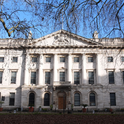Here is a sentence I never thought I would write. Britain’s global reputation, its hopes of economic recovery and a vital constitutional principle could depend on the actions of the House of Lords. That any, let alone all, of these three things are in jeopardy is bad enough. For their defence to be in the hands of unelected legislators with no democratic mandate doubles the nightmare.
We may hope that this grim scenario will be avoided. Maybe enough Conservative MPs will rebel this week and kill the Internal Market Bill, or amend it to make sure that Britain will continue to abide by a treaty that parliament ratified as recently as January. Maybe Boris Johnson will back off: U-turns have become a way of life for him. Maybe the EU will buckle.
Hope, though, is not enough. We may hope that Arsenal will win the Premiership, that Crossrail will suffer no more delays, and that the rain will never fall till after sundown. Hope lifts the spirits but can be a fickle friend. Suppose the bill is approved by the Commons this week. What then?
The battle will move to the House of Lords. Since the Conservatives returned to office in 2010, the Lords have defeated the government 268 times, often on Europe. However, peers never defied the Commons outright on a major issue. Either the vote was an expression of opinion rather than a vote on a piece of legislation; or the Lords voted, in effect, to ask the Commons to think again—usually on a specific issue rather than a point of principle—and MPs agreed to do so; or the Commons held its ground and, in the end, the Lords gave way. None of the 268 votes blocked a bill that the government was determined to pass and for which it had a majority in the House of Commons.
We should bear this in mind when we hear that the Lords will oppose the Internal Market Bill. Peers might well vote it down once, or even twice. The question is, will they use their power to block the bill altogether?
The Lords have specific, but limited, powers. Under the Parliament Act, peers have no say on money bills, such as the annual Finance Bill which legislates for the Budget. And under the Salisbury Convention, they should endorse any measure that implements pledges from the government’s election-winning manifesto. The Internal Market Bill is neither a money bill, nor does it reflect a manifesto commitment. If anything, the bill undermines Johnson’s election promise to put his Withdrawal Agreement into effect. Indeed, one reason why last December’s election was held at all was to secure a Commons majority for the very agreement that now offends the prime minister.
Formally, then, the Lords has every right to block the bill. To be precise: it can hold the bill up for a year. After that time, the Commons has the right to pass the legislation without the approval of the Lords. That wouldn’t help the prime minister. A year’s delay would wreck his plan to override the Northern Ireland Protocol when the Brexit transition phase ends this December. In this instance, Johnson delayed will be Johnson denied.
Informally, however, the Lords seldom use their power of delay. Since the original Parliament Act was passed in 1911, only seven bills have been held up; and only one of them was tabled by a Conservative Government. Thirty years ago, Margaret Thatcher wanted to make it easier to prosecute the few remaining Nazis accused of war crimes. Most peers, including a significant number of Conservatives, thought that the bill contained important defects. The War Crimes Act was delayed by a year.
Almost always, the Lords eventually back down. Rightly so: it is a big step for unelected peers to thwart the will of elected MPs. The risks of a constitutional crisis are obvious. In more self-interested terms, peers know that if they block the Commons too often and without good reason, the upper chamber might be radically changed or even abolished. Today’s peers could be ejected from parliament altogether.
Let’s leave that prospect—delicious or disastrous, according to taste—for another time. Today’s issue is whether, given the formal and informal rules that govern their operation, the Lords can block the Internal Market Bill; and, if so, whether they should.
The numbers first. Roughly one-third of peers are Conservative, one third are Labour or Liberal Democrat and one third are non-party (crossbenchers, non-aligned and bishops). Votes depend on who turns up and the size of any rebellion. The results are often unpredictable—party whipping is nothing like as fierce as in the Commons, not least because peers (other than bishops) are there for life and often at the end of their careers, meaning they have less fear of jeopardising their future prospects.
On this occasion, there is almost certainly a majority against the Internal Market Bill. It comprises almost all Labour and Lib Dem peers, a fair number of crossbench and non-aligned peers, and a significant minority of Tories. Moreover, because of Covid-19, peers currently vote remotely via their computer or mobile phone. Before the summer break, this increased the turnout when divisions were called. The increase has been highest among opposition peers, and the government has suffered some heavy defeats. The question is not whether the majority exists, but whether it will hold together to block the bill completely.
If either Keir Starmer or Ed Davey wants their parties to back down in the end, the answer is plainly no. Their peers will approve the bill, or abstain, and Johnson will get his way. But suppose that both opposition leaders decide that the Lords have a fundamental duty to protect the vital principle that the United Kingdom must abide by its international treaty obligations. They could argue that democracy is not just about counting votes at elections, but also basic constitutional safeguards that parliament must defend. Starmer and Davey could say that Labour and Lib Dem peers are upholding democracy, not undermining it. If they hold firm, there is a real prospect that the bill will not become law.
For Starmer, in particular, this could be the biggest decision he has to take this year. Writing in the Sunday Telegraph, he has offered to back the Internal Market Bill “if the government fixes substantial cross-party concerns” about it. But he doesn’t say what Labour will do if the Commons passes the Bill as it stands and it then goes to the Lords.
If he instructs Labour peers to stand firm, he risks being accused of undermining the result of last December’s election. He also risks being tarred with the reputation he has tried so hard to shake off: of being a “Remoaner” who wants to overturn the Brexit referendum. Unfair? Yes. (He has publicly accepted not just the results but the consequences of both the referendum and the election.) But when was politics ever fair?
Starmer’s choice is not easy. Choices that matter seldom are. If the House of Commons backs the government this week, Labour’s leader may well have something that opposition leaders rarely experience: a moment of real power. How will he use it? The next fortnight could set as big a test for him as it does for the prime minister.
If MPs cannot be relied upon to protect the UK’s international reputation, can the Lords?
The Upper House may have a decisive role to play in this sorry saga
September 14, 2020

Peers in ceremonial dress during the State Opening of Parliament in 2019. phoot: Aaron Chown/PA Archive/PA Images












